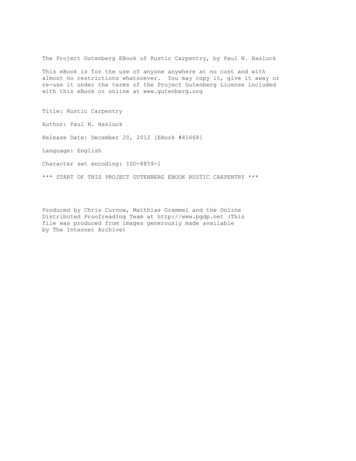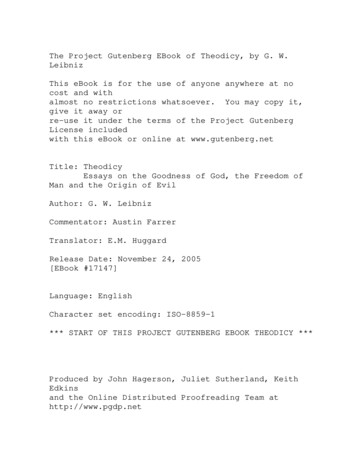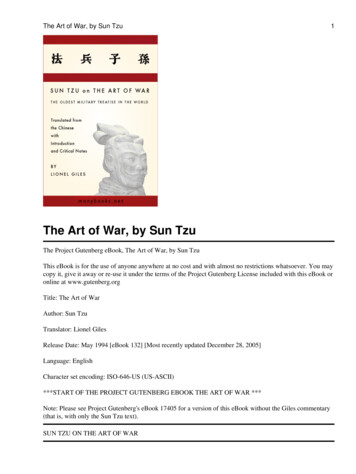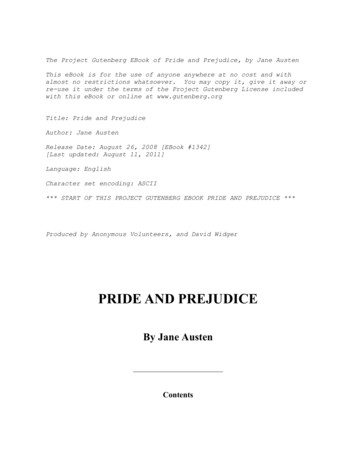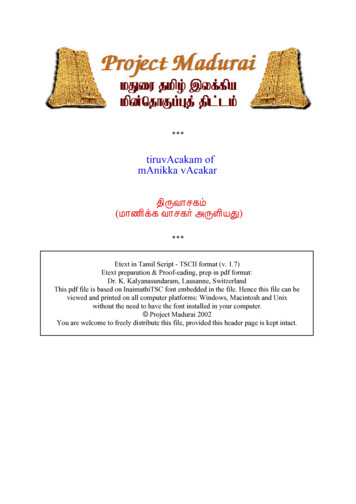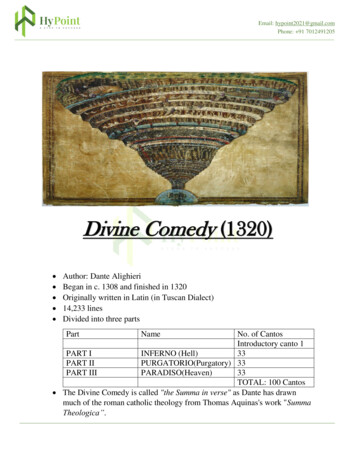
Transcription
***The Project Gutenberg Etext of The Divine Comedy of Dante***Translanted by Henry Wadsworth LongfellowCopyright laws are changing all over the world, be sure to checkthe copyright laws for your country before posting these files!!Please take a look at the important information in this header.We encourage you to keep this file on your own disk, keeping anelectronic path open for the next readers. Do not remove this.**Welcome To The World of Free Plain Vanilla Electronic Texts****Etexts Readable By Both Humans and By Computers, Since 1971***These Etexts Prepared By Hundreds of Volunteers and Donations*Information on contacting Project Gutenberg to get Etexts, andfurther information is included below. We need your donations.The Divine Comedy of Dante by H. W. LongfellowAugust, 1997[Etext #1004]***The Project Gutenberg Etext of The Divine Comedy of Dante*******This file should be named 0ddcl10.txtt or 0ddcl10.zip*****Corrected EDITIONS of our etexts get a new NUMBER, 0ddcl11.txt.VERSIONS based on separate sources get new LETTER, 0ddcl10a.txt.This etext was prepared by Dennis McCarthy, Atlanta, GA.We are now trying to release all our books one month in advanceof the official release dates, for time for better editing.Please note: neither this list nor its contents are final tillmidnight of the last day of the month of any such announcement.The official release date of all Project Gutenberg Etexts is atMidnight, Central Time, of the last day of the stated month. Apreliminary version may often be posted for suggestion, commentand editing by those who wish to do so. To be sure you have anup to date first edition [xxxxx10x.xxx] please check file sizesin the first week of the next month. Since our ftp program hasa bug in it that scrambles the date [tried to fix and failed] alook at the file size will have to do, but we will try to see anew copy has at least one byte more or less.Information about Project Gutenberg (one page)We produce about two million dollars for each hour we work.The
fifty hours is one conservative estimate for how long it we taketo get any etext selected, entered, proofread, edited, copyrightsearched and analyzed, the copyright letters written, etc. Thisprojected audience is one hundred million readers. If our valueper text is nominally estimated at one dollar then we produce 2million dollars per hour this year as we release thirty-two textfiles per month, or 384 more Etexts in 1997 for a total of 1000 If these reach just 10% of the computerized population, then thetotal should reach over 100 billion Etexts given away.The Goal of Project Gutenberg is to Give Away One Trillion EtextFiles by the December 31, 2001. [10,000 x 100,000,000 Trillion]This is ten thousand titles each to one hundred million readers,which is only 10% of the present number of computer users. 2001should have at least twice as many computer users as that, so itwill require us reaching less than 5% of the users in 2001.We need your donations more than ever!All donations should be made to "Project Gutenberg/CMU": and aretax deductible to the extent allowable by law. (CMU CarnegieMellon University).For these and other matters, please mail to:Project GutenbergP. O. Box 2782Champaign, IL 61825When all other email fails try our Executive Director:Michael S. Hart hart@pobox.com We would prefer to send you this information by email(Internet, Bitnet, Compuserve, ATTMAIL or MCImail).******If you have an FTP program (or emulator), pleaseFTP directly to the Project Gutenberg archives:[Mac users, do NOT point and click. . .type]ftp uiarchive.cso.uiuc.edulogin: anonymouspassword: your@logincd etext/etext90 through /etext96or cd etext/articles [get suggest gut for more information]dir [to see files]get or mget [to get files. . .set bin for zip files]GET INDEX?00.GUTfor a list of booksandGET NEW GUT for general informationandMGET GUT* for newsletters.**Information prepared by the Project Gutenberg legal advisor**
(Three Pages)***START**THE SMALL PRINT!**FOR PUBLIC DOMAIN ETEXTS**START***Why is this "Small Print!" statement here? You know: lawyers.They tell us you might sue us if there is something wrong withyour copy of this etext, even if you got it for free fromsomeone other than us, and even if what's wrong is not ourfault. So, among other things, this "Small Print!" statementdisclaims most of our liability to you. It also tells you howyou can distribute copies of this etext if you want to.*BEFORE!* YOU USE OR READ THIS ETEXTBy using or reading any part of this PROJECT GUTENBERG-tmetext, you indicate that you understand, agree to and acceptthis "Small Print!" statement. If you do not, you can receivea refund of the money (if any) you paid for this etext bysending a request within 30 days of receiving it to the personyou got it from. If you received this etext on a physicalmedium (such as a disk), you must return it with your request.ABOUT PROJECT GUTENBERG-TM ETEXTSThis PROJECT GUTENBERG-tm etext, like most PROJECT GUTENBERGtm etexts, is a "public domain" work distributed by ProfessorMichael S. Hart through the Project Gutenberg Association atCarnegie-Mellon University (the "Project"). Among otherthings, this means that no one owns a United States copyrighton or for this work, so the Project (and you!) can copy anddistribute it in the United States without permission andwithout paying copyright royalties. Special rules, set forthbelow, apply if you wish to copy and distribute this etextunder the Project's "PROJECT GUTENBERG" trademark.To create these etexts, the Project expends considerableefforts to identify, transcribe and proofread public domainworks. Despite these efforts, the Project's etexts and anymedium they may be on may contain "Defects". Among otherthings, Defects may take the form of incomplete, inaccurate orcorrupt data, transcription errors, a copyright or otherintellectual property infringement, a defective or damageddisk or other etext medium, a computer virus, or computercodes that damage or cannot be read by your equipment.LIMITED WARRANTY; DISCLAIMER OF DAMAGESBut for the "Right of Replacement or Refund" described below,[1] the Project (and any other party you may receive thisetext from as a PROJECT GUTENBERG-tm etext) disclaims allliability to you for damages, costs and expenses, includinglegal fees, and [2] YOU HAVE NO REMEDIES FOR NEGLIGENCE ORUNDER STRICT LIABILITY, OR FOR BREACH OF WARRANTY OR CONTRACT,INCLUDING BUT NOT LIMITED TO INDIRECT, CONSEQUENTIAL, PUNITIVEOR INCIDENTAL DAMAGES, EVEN IF YOU GIVE NOTICE OF THEPOSSIBILITY OF SUCH DAMAGES.If you discover a Defect in this etext within 90 days ofreceiving it, you can receive a refund of the money (if any)you paid for it by sending an explanatory note within that
time to the person you received it from. If you received iton a physical medium, you must return it with your note, andsuch person may choose to alternatively give you a replacementcopy. If you received it electronically, such person maychoose to alternatively give you a second opportunity toreceive it electronically.THIS ETEXT IS OTHERWISE PROVIDED TO YOU "AS-IS". NO OTHERWARRANTIES OF ANY KIND, EXPRESS OR IMPLIED, ARE MADE TO YOU ASTO THE ETEXT OR ANY MEDIUM IT MAY BE ON, INCLUDING BUT NOTLIMITED TO WARRANTIES OF MERCHANTABILITY OR FITNESS FOR APARTICULAR PURPOSE.Some states do not allow disclaimers of implied warranties orthe exclusion or limitation of consequential damages, so theabove disclaimers and exclusions may not apply to you, and youmay have other legal rights.INDEMNITYYou will indemnify and hold the Project, its directors,officers, members and agents harmless from all liability, costand expense, including legal fees, that arise directly orindirectly from any of the following that you do or cause:[1] distribution of this etext, [2] alteration, modification,or addition to the etext, or [3] any Defect.DISTRIBUTION UNDER "PROJECT GUTENBERG-tm"You may distribute copies of this etext electronically, or bydisk, book or any other medium if you either delete this"Small Print!" and all other references to Project Gutenberg,or:[1]Only give exact copies of it. Among other things, thisrequires that you do not remove, alter or modify theetext or this "small print!" statement. You may however,if you wish, distribute this etext in machine readablebinary, compressed, mark-up, or proprietary form,including any form resulting from conversion by word processing or hypertext software, but only so long as*EITHER*:[*]The etext, when displayed, is clearly readable, anddoes *not* contain characters other than thoseintended by the author of the work, although tilde( ), asterisk (*) and underline ( ) characters maybe used to convey punctuation intended by theauthor, and additional characters may be used toindicate hypertext links; OR[*]The etext may be readily converted by the reader atno expense into plain ASCII, EBCDIC or equivalentform by the program that displays the etext (as isthe case, for instance, with most word processors);OR[*]You provide, or agree to also provide on request atno additional cost, fee or expense, a copy of the
etext in its original plain ASCII form (or in EBCDICor other equivalent proprietary form).[2]Honor the etext refund and replacement provisions of this"Small Print!" statement.[3]Pay a trademark license fee to the Project of 20% of thenet profits you derive calculated using the method youalready use to calculate your applicable taxes. If youdon't derive profits, no royalty is due. Royalties arepayable to "Project Gutenberg Association/Carnegie-MellonUniversity" within the 60 days following eachdate you prepare (or were legally required to prepare)your annual (or equivalent periodic) tax return.WHAT IF YOU *WANT* TO SEND MONEY EVEN IF YOU DON'T HAVE TO?The Project gratefully accepts contributions in money, time,scanning machines, OCR software, public domain etexts, royaltyfree copyright licenses, and every other sort of contributionyou can think of. Money should be paid to "Project GutenbergAssociation / Carnegie-Mellon University".*END*THE SMALL PRINT! FOR PUBLIC DOMAIN ETEXTS*Ver.04.29.93*END*This etext was prepared by Dennis McCarthy, Atlanta, GA.THE DIVINE COMEDYOF DANTE ALIGHIERI(1265-1321)TRANSLATED BYHENRY WADSWORTH LONGFELLOW(1807-1882)CREDITSThe base text for this edition has been provided by Digital Dante,a project sponsored by Columbia University's Institute for LearningTechnologies. Specific thanks goes to Jennifer Hogan (ProjectEditor/Director), Tanya Larkin (Assistant to Editor), Robert W. Cole(Proofreader/Assistant Editor), and Jennifer Cook (Proofreader).
The Digital Dante Project is a digital 'study space' for Dante studiesandscholarship. The project is multi-faceted and fluid by nature of theWeb.Digital Dante attempts to organize the information most significant forstudents first engaging with Dante and scholars researching Dante. Thedigital of Digital Dante incurs a new challenge to the student, thescholar, and teacher, perusing the Web: to become proficient in the newtools, e.g., Search, the Discussion Group, well enough to look beyondthetechnology and delve into the content. For more information and accesstothe project, please visit its web site at:http://www.ilt.columbia.edu/projects/dante/For this Project Gutenberg edition the e-text was rechecked. Theeditorgreatly thanks Dian McCarthy for her assistance in proofreading theParadiso. Also deserving praise are Herbert Fann for programming thetexteditor "Desktop Tools/Edit" and the late August Dvorak for designinghiskeyboard layout. Please refer to Project Gutenberg's e-text listingsforother editions or translations of 'The Divine Comedy.' Please refer tothe end of this file for supplemental materials.Dennis McCarthy, July 1997imprimatur@juno.comCONTENTSInfernoI. The Dark Forest. The Hill of Difficulty. The Panther,the Lion, and the Wolf. Virgil.II. The Descent. Dante's Protest and Virgil's Appeal.The Intercession of the Three Ladies Benedight.III. The Gate of Hell. The Inefficient or Indifferent.Pope Celestine V. The Shores of Acheron. Charon.The Earthquake and the Swoon.IV. The First Circle, Limbo: Virtuous Pagans and the Unbaptized.The Four Poets, Homer, Horace, Ovid, and Lucan. The NobleCastle of Philosophy.V. The Second Circle: The Wanton. Minos. The Infernal Hurricane.Francesca da Rimini.VI. The Third Circle: The Gluttonous. Cerberus. The Eternal Rain.Ciacco. Florence.VII. The Fourth Circle: The Avaricious and the Prodigal.Plutus. Fortune and her Wheel. The Fifth Circle:The Irascible and the Sullen. Styx.VIII. Phlegyas. Philippo Argenti. The Gate of the City of Dis.IX. The Furies and Medusa. The Angel. The City of Dis.
The Sixth Circle: Heresiarchs.X. Farinata and Cavalcante de' Cavalcanti. Discourse on theKnowledge of the Damned.XI. The Broken Rocks. Pope Anastasius. General Description ofthe Inferno and its Divisions.XII. The Minotaur. The Seventh Circle: The Violent.The River Phlegethon. The Violent against their Neighbours.The Centaurs. Tyrants.XIII. The Wood of Thorns. The Harpies. The Violentagainst themselves. Suicides. Pier della Vigna.Lano and Jacopo da Sant' Andrea.XIV. The Sand Waste and the Rain of Fire. The Violent against God.Capaneus. The Statue of Time, and the Four Infernal Rivers.XV. The Violent against Nature. Brunetto Latini.XVI. Guidoguerra, Aldobrandi, and Rusticucci. Cataract ofthe River of Blood.XVII. Geryon. The Violent against Art. Usurers. Descent intothe Abyss of Malebolge.XVIII. The Eighth Circle, Malebolge: The Fraudulent andthe Malicious. The First Bolgia: Seducers and Panders.Venedico Caccianimico. Jason. The Second Bolgia:Flatterers. Allessio Interminelli. Thais.XIX. The Third Bolgia: Simoniacs. Pope Nicholas III.Dante's Reproof of corrupt Prelates.XX. The Fourth Bolgia: Soothsayers. Amphiaraus, Tiresias, Aruns,Manto, Eryphylus, Michael Scott, Guido Bonatti, and Asdente.Virgil reproaches Dante's Pity. Mantua's Foundation.XXI. The Fifth Bolgia: Peculators. The Elder of Santa Zita.Malacoda and other Devils.XXII. Ciampolo, Friar Gomita, and Michael Zanche.The Malabranche quarrel.XXIII. Escape from the Malabranche. The Sixth Bolgia: Hypocrites.Catalano and Loderingo. Caiaphas.XXIV. The Seventh Bolgia: Thieves. Vanni Fucci. Serpents.XXV. Vanni Fucci's Punishment. Agnello Brunelleschi,Buoso degli Abati, Puccio Sciancato, Cianfa de' Donati,and Guercio Cavalcanti.XXVI. The Eighth Bolgia: Evil Counsellors. Ulysses and Diomed.Ulysses' Last Voyage.XXVII. Guido da Montefeltro. His deception by Pope Boniface VIII.XXVIII. The Ninth Bolgia: Schismatics. Mahomet and Ali.Pier da Medicina, Curio, Mosca, and Bertrand de Born.XXIX. Geri del Bello. The Tenth Bolgia: Alchemists.Griffolino d' Arezzo and Capocchino.XXX. Other Falsifiers or Forgers. Gianni Schicchi, Myrrha,Adam of Brescia, Potiphar's Wife, and Sinon of Troy.XXXI. The Giants, Nimrod, Ephialtes, and Antaeus.Descent to Cocytus.XXXII. The Ninth Circle: Traitors. The Frozen Lake of Cocytus.First Division, Caina: Traitors to their Kindred.Camicion de' Pazzi. Second Division, Antenora:Traitors to their Country. Dante questionsBocca degli Abati. Buoso da Duera.XXXIII. Count Ugolino and the Archbishop Ruggieri. The Deathof Count Ugolino's Sons. Third Division of the Ninth Circle,Ptolomaea: Traitors to their Friends. Friar Alberigo,Branco d' Oria.
XXXIV. Fourth Division of the Ninth Circle, the Judecca:Traitors to their Lords and Benefactors. Lucifer,Judas Iscariot, Brutus, and Cassius. The Chasm of Lethe.The Ascent.PurgatorioI. The Shores of Purgatory. The Four Stars. Cato of Utica.The Rush.II. The Celestial Pilot. Casella. The Departure.III. Discourse on the Limits of Reason. The Foot of the Mountain.Those who died in Contumacy of Holy Church. Manfredi.IV. Farther Ascent. Nature of the Mountain. The Negligent,who postponed Repentance till the last Hour. Belacqua.V. Those who died by Violence, but repentant.Buonconte di Monfeltro. La Pia.VI. Dante's Inquiry on Prayers for the Dead. Sordello. Italy.VII. The Valley of Flowers. Negligent Princes.VIII. The Guardian Angels and the Serpent. Nino di Gallura.The Three Stars. Currado Malaspina.IX. Dante's Dream of the Eagle. The Gate of Purgatory andthe Angel. Seven P's. The Keys.X. The Needle's Eye. The First Circle: The Proud.The Sculptures on the Wall.XI. The Humble Prayer. Omberto di Santafiore.Oderisi d' Agobbio. Provenzan Salvani.XII. The Sculptures on the Pavement. Ascent to the Second Circle.XIII. The Second Circle: The Envious. Sapia of Siena.XIV. Guido del Duca and Renier da Calboli. Cities ofthe Arno Valley. Denunciation of Stubbornness.XV. The Third Circle: The Irascible. Dante's Visions. The Smoke.XVI. Marco Lombardo. Lament over the State of the World.XVII. Dante's Dream of Anger. The Fourth Circle: The Slothful.Virgil's Discourse of Love.XVIII. Virgil further discourses of Love and Free Will.The Abbot of San Zeno.XIX. Dante's Dream of the Siren. The Fifth Circle:The Avaricious and Prodigal. Pope Adrian V.XX. Hugh Capet. Corruption of the French Crown.Prophecy of the Abduction of Pope Boniface VIII andthe Sacrilege of Philip the Fair. The Earthquake.XXI. The Poet Statius. Praise of Virgil.XXII. Statius' Denunciation of Avarice. The Sixth Circle:The Gluttonous. The Mystic Tree.XXIII. Forese. Reproof of immodest Florentine Women.XXIV. Buonagiunta da Lucca. Pope Martin IV, and others.Inquiry into the State of Poetry.XXV. Discourse of Statius on Generation. The Seventh Circle:The Wanton.XXVI. Sodomites. Guido Guinicelli and Arnaldo Daniello.XXVII. The Wall of Fire and the Angel of God. Dante's Sleepupon the Stairway, and his Dream of Leah and Rachel.Arrival at the Terrestrial Paradise.XXVIII. The River Lethe. Matilda. The Nature ofthe Terrestrial Paradise.XXIX. The Triumph of the Church.
XXX. Virgil's Departure. Beatrice. Dante's Shame.XXXI. Reproaches of Beatrice and Confession of Dante.The Passage of Lethe. The Seven Virtues. The Griffon.XXXII. The Tree of Knowledge. Allegory of the Chariot.XXXIII. Lament over the State of the Church. Final Reproachesof Beatrice. The River Eunoe.ParadisoI. The Ascent to the First Heaven. The Sphere of Fire.II. The First Heaven, the Moon: Spirits who, having takenSacred Vows, were forced to violate them. The Lunar Spots.III. Piccarda Donati and the Empress Constance.IV. Questionings of the Soul and of Broken Vows.V. Discourse of Beatrice on Vows and Compensations.Ascent to the Second Heaven, Mercury: Spirits who forthe Love of Fame achieved great Deeds.VI. Justinian. The Roman Eagle. The Empire. Romeo.VII. Beatrice's Discourse of the Crucifixion, the Incarnation,the Immortality of the Soul, and the Resurrection of the Body.VIII. Ascent to the Third Heaven, Venus: Lovers. Charles Martel.Discourse on diverse Natures.IX. Cunizza da Romano, Folco of Marseilles, and Rahab.Neglect of the Holy Land.X. The Fourth Heaven, the Sun: Theologians and Fathers ofthe Church. The First Circle. St. Thomas of Aquinas.XI. St. Thomas recounts the Life of St. Francis. Lament overthe State of the Dominican Order.XII. St. Buonaventura recounts the Life of St. Dominic. Lamentover the State of the Franciscan Order. The Second Circle.XIII. Of the Wisdom of Solomon. St. Thomas reproachesDante's Judgement.XIV. The Third Circle. Discourse on the Resurrection of the Flesh.The Fifth Heaven, Mars: Martyrs and Crusaders who died fightingfor the true Faith. The Celestial Cross.XV. Cacciaguida. Florence in the Olden Time.XVI. Dante's Noble Ancestry. Cacciaguida's Discourse ofthe Great Florentines.XVII. Cacciaguida's Prophecy of Dante's Banishment.XVIII. The Sixth Heaven, Jupiter: Righteous Kings and Rulers.The Celestial Eagle. Dante's Invectives againstecclesiastical Avarice.XIX. The Eagle discourses of Salvation, Faith, and Virtue.Condemnation of the vile Kings of A.D. 1300.XX. The Eagle praises the Righteous Kings of old.Benevolence of the Divine Will.XXI. The Seventh Heaven, Saturn: The Contemplative.The Celestial Stairway. St. Peter Damiano. His Invectivesagainst the Luxury of the Prelates.XXII. St. Benedict. His Lamentation over the Corruption of Monks.The Eighth Heaven, the Fixed Stars.XXIII. The Triumph of Christ. The Virgin Mary. The Apostles.Gabriel.XXIV. The Radiant Wheel. St. Peter examines Dante on Faith.XXV. The Laurel Crown. St. James examines Dante on Hope.Dante's Blindness.
XXVI. St. John examines Dante on Charity. Dante's Sight. Adam.XXVII. St. Peter's reproof of bad Popes. The Ascent tothe Ninth Heaven, the 'Primum Mobile.'XXVIII. God and the Angelic Hierarchies.XXIX. Beatrice's Discourse of the Creation of the Angels,and of the Fall of Lucifer. Her Reproof of Foolish andAvaricious Preachers.XXX. The Tenth Heaven, or Empyrean. The River of Light.The Two Courts of Heaven. The White Rose of Paradise.The great Throne.XXXI. The Glory of Paradise. Departure of Beatrice. St. Bernard.XXXII. St. Bernard points out the Saints in the White Rose.XXXIII. Prayer to the Virgin. The Threefold Circle of the Trinity.Mystery of the Divine and Human Nature.Incipit Comoedia Dantis Alagherii,Florentini natione, non moribus.The Divine Comedytranslated by Henry Wadsworth Longfellow(e-text courtesy ILT's Digital Dante Project)
55657INFERNOInferno: Canto IMidway upon the journey of our lifeI found myself within a forest dark,For the straightforward pathway had been lost.Ah me! how hard a thing it is to sayWhat was this forest savage, rough, and stern,Which in the very thought renews the fear.So bitter is it, death is little more;But of the good to treat, which there I found,Speak will I of the other things I saw there.I cannot well repeat how there I entered,So full was I of slumber at the momentIn which I had abandoned the true way.But after I had reached a mountain's foot,At that point where the valley terminated,Which had with consternation pierced my heart,Upward I looked, and I beheld its shoulders,Vested already with that planet's raysWhich leadeth others right by every road.Then was the fear a little quietedThat in my heart's lake had endured throughoutThe night, which I had passed so piteously.And even as he, who, with distressful breath,Forth issued from the sea upon the shore,Turns to the water perilous and gazes;So did my soul, that still was fleeing onward,Turn itself back to re-behold the passWhich never yet a living person left.After my weary body I had rested,The way resumed I on the desert slope,So that the firm foot ever was the lower.And lo! almost where the ascent began,A panther light and swift exceedingly,Which with a spotted skin was covered o'er!And never moved she from before my face,Nay, rather did impede so much my way,That many times I to return had turned.The time was the beginning of the morning,And up the sun was mounting with those stars
05106107108109110111112113114That with him were, what time the Love DivineAt first in motion set those beauteous things;So were to me occasion of good hope,The variegated skin of that wild beast,The hour of time, and the delicious season;But not so much, that did not give me fearA lion's aspect which appeared to me.He seemed as if against me he were comingWith head uplifted, and with ravenous hunger,So that it seemed the air was afraid of him;And a she-wolf, that with all hungeringsSeemed to be laden in her meagreness,And many folk has caused to live forlorn!She brought upon me so much heaviness,With the affright that from her aspect came,That I the hope relinquished of the height.And as he is who willingly acquires,And the time comes that causes him to lose,Who weeps in all his thoughts and is despondent,E'en such made me that beast withouten peace,Which, coming on against me by degreesThrust me back thither where the sun is silent.While I was rushing downward to the lowland,Before mine eyes did one present himself,Who seemed from long-continued silence hoarse.When I beheld him in the desert vast,"Have pity on me," unto him I cried,"Whiche'er thou art, or shade or real man!"He answered me: "Not man; man once I was,And both my parents were of Lombardy,And Mantuans by country both of them.'Sub Julio' was I born, though it was late,And lived at Rome under the good Augustus,During the time of false and lying gods.A poet was I, and I sang that justSon of Anchises, who came forth from Troy,After that Ilion the superb was burned.But thou, why goest thou back to such annoyance?Why climb'st thou not the Mount Delectable,Which is the source and cause of every joy?""Now, art thou that Virgilius and that fountainWhich spreads abroad so wide a river of speech?"I made response to him with bashful forehead.
165166167168169170171"O, of the other poets honour and light,Avail me the long study and great loveThat have impelled me to explore thy volume!Thou art my master, and my author thou,Thou art alone the one from whom I tookThe beautiful style that has done honour to me.Behold the beast, for which I have turned back;Do thou protect me from her, famous Sage,For she doth make my veins and pulses tremble.""Thee it behoves to take another road,"Responded he, when he beheld me weeping,"If from this savage place thou wouldst escape;Because this beast, at which thou criest out,Suffers not any one to pass her way,But so doth harass him, that she destroys him;And has a nature so malign and ruthless,That never doth she glut her greedy will,And after food is hungrier than before.Many the animals with whom she weds,And more they shall be still, until the GreyhoundComes, who shall make her perish in her pain.He shall not feed on either earth or pelf,But upon wisdom, and on love and virtue;'Twixt Feltro and Feltro shall his nation be;Of that low Italy shall he be the saviour,On whose account the maid Camilla died,Euryalus, Turnus, Nisus, of their wounds;Through every city shall he hunt her down,Until he shall have driven her back to Hell,There from whence envy first did let her loose.Therefore I think and judge it for thy bestThou follow me, and I will be thy guide,And lead thee hence through the eternal place,Where thou shalt hear the desperate lamentations,Shalt see the ancient spirits disconsolate,Who cry out each one for the second death;And thou shalt see those who contented areWithin the fire, because they hope to come,Whene'er it may be, to the blessed people;To whom, then, if thou wishest to ascend,A soul shall be for that than I more worthy;With her at my departure I will leave thee;
222223224225226227228Because that Emperor, who reigns above,In that I was rebellious to his law,Wills that through me none come into his city.He governs everywhere, and there he reigns;There is his city and his lofty throne;O happy he whom thereto he elects!"And I to him: "Poet, I thee entreat,By that same God whom thou didst never know,So that I may escape this woe and worse,Thou wouldst conduct me there where thou hast said,That I may see the portal of Saint Peter,And those thou makest so disconsolate."Then he moved on, and I behind him followed.Inferno: Canto IIDay was departing, and the embrowned airReleased the animals that are on earthFrom their fatigues; and I the only oneMade myself ready to sustain the war,Both of the way and likewise of the woe,Which memory that errs not shall retrace.O Muses, O high genius, now assist me!O memory, that didst write down what I saw,Here thy nobility shall be manifest!And I began: "Poet, who guidest me,Regard my manhood, if it be sufficient,Ere to the arduous pass thou dost confide me.Thou sayest, that of Silvius the parent,While yet corruptible, unto the worldImmortal went, and was there bodily.But if the adversary of all evilWas courteous, thinking of the high effectThat issue would from him, and who, and what,To men of intellect unmeet it seems not;For he was of great Rome, and of her empireIn the empyreal heaven as father chosen;The which and what, wishing to speak the truth,Were stablished as the holy place, whereinSits the successor of the greatest Peter.Upon this journey, whence thou givest him vaunt,Things did he hear, which the occasion were
279280281282283284285Both of his victory and the papal mantle.Thither went afterwards the Chosen Vessel,To bring back comfort thence unto that Faith,Which of salvation's way is the beginning.But I, why thither come, or who concedes it?I not Aeneas am, I am not Paul,Nor I, nor others, think me worthy of it.Therefore, if I resign myself to come,I fear the coming may be ill-advised;Thou'rt wise, and knowest better than I speak."And as he is, who unwills what he willed,And by new thoughts doth his intention change,So that from his design he quite withdraws,Such I became, upon that dark hillside,Because, in thinking, I consumed the emprise,Which was so very prompt in the beginning."If I have well thy language understood,"Replied that shade of the Magnanimous,"Thy soul attainted is with cowardice,Which many times a man encumbers so,It turns him back from honoured enterprise,As false sight doth a beast, when he is shy.That thou mayst free thee from this apprehension,I'll tell thee why I came, and what I heardAt the first moment when I grieved for thee.Among those was I who are in suspense,And a fair, saintly Lady called to meIn such wise, I besought her to command me.Her eyes where shining brighter than the Star;And she began to say, gentle and low,With voice angelical, in her own language:'O spirit
The Divine Comedy of Dante by H. W. Longfellow . August, 1997 [Etext #1004] ***The Project Gutenberg Etext of The Divine Comedy of Dante*** ****This file should be named 0ddcl10.txtt or 0ddcl10.zip***** Corrected EDITIONS of our etexts get a new NUMBER, 0ddcl11.txt. VERSIONS based on separate sources get new LETTER, 0ddcl10a.txt.

